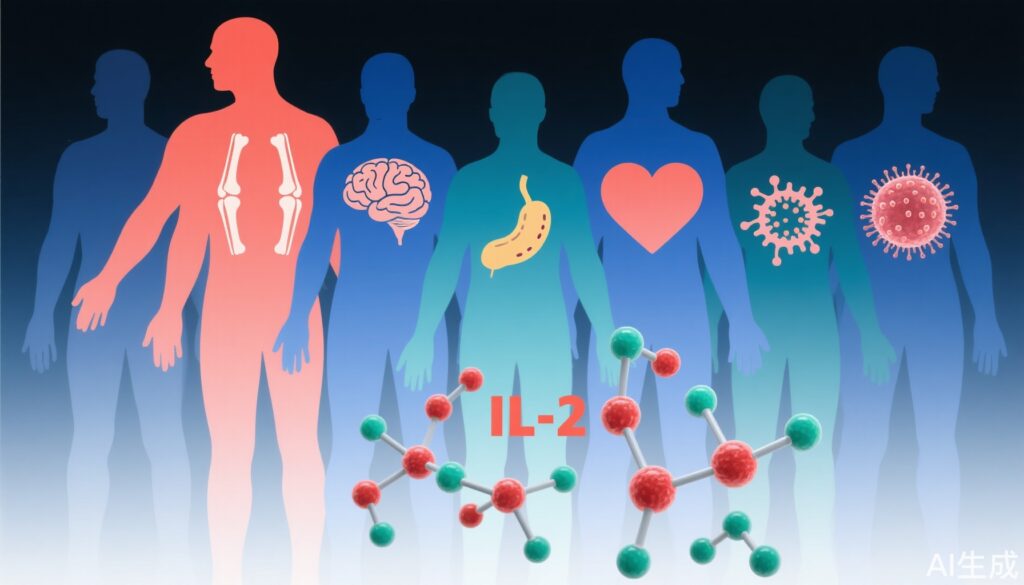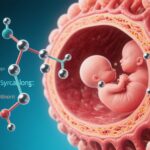Highlights
- Low-dose interleukin-2 (IL-2) selectively expands and activates regulatory T cells (Tregs) without stimulating effector T cells, promoting immune tolerance.
- Clinical trials across more than 13 diseases demonstrate safety and preliminary efficacy in autoimmune, neurodegenerative, metabolic, transplant, and inflammatory conditions.
- Emerging data suggest benefits in hard-to-treat diseases such as ALS, Alzheimer’s, bipolar depression, and type 2 diabetes, with ongoing investigation into optimal dosing and combinatory regimens.
- Low-dose IL-2 is well-tolerated and may fill a major unmet need in immune modulation therapy.
Study Background and Disease Burden
Regulatory T cells (Tregs) are critical immune cells that enforce self-tolerance and prevent autoimmunity. Treg insufficiency or dysfunction is implicated in a broad range of disorders, including autoimmune diseases (e.g., lupus, rheumatoid arthritis), neurodegenerative diseases (e.g., ALS, Alzheimer’s), metabolic syndromes (e.g., type 2 diabetes), transplant rejection, and systemic inflammatory states. Despite advances in immunomodulatory therapy, most interventions broadly suppress immunity, risking infection and malignancy. Selectively enhancing Treg function is an emerging strategy to restore immune balance without global immunosuppression. Interleukin-2 (IL-2), a cytokine crucial to Treg survival and function, can—at low doses—preferentially stimulate Tregs due to their high-affinity IL-2 receptor expression, offering a novel, targeted approach.
Study Design
Recent clinical research encompasses a spectrum of study designs:
- Basket phase 2a open-label trials (Lorenzon et al., Rosenzwajg et al.) assessing low-dose IL-2 (typically 1 million IU/day for 5 days, then fortnightly) in patients with one of 11 or 13 autoimmune diseases.
- Randomized, double-blind, placebo-controlled trials in neurodegenerative (ALS, Alzheimer’s) and psychiatric (bipolar depression) disorders.
- Animal models for metabolic disease (type 2 diabetes) and translational studies in transplantation.
- Patient populations span mild to moderate disease states, with endpoints including Treg expansion, immune activation profiling, validated clinical scales, and disease-specific biomarkers.
Key Findings
Autoimmune Diseases
Large basket trials (81 patients across 13 autoimmune diseases; 46 patients across 11 diseases) found low-dose IL-2 was well-tolerated and induced significant, specific expansion and activation of Tregs without stimulating effector T cells (Teffs). This immunological effect was consistent across diseases, including rheumatoid arthritis, ankylosing spondylitis, systemic lupus erythematosus, Behçet’s disease, Sjögren’s syndrome, systemic sclerosis, psoriasis, granulomatosis with polyangiitis, Takayasu’s arteritis, Crohn’s disease, ulcerative colitis, autoimmune hepatitis, and sclerosing cholangitis. Clinical efficacy signals included improvement on the Clinical Global Impression scale and disease-specific scores in several cohorts (notably ankylosing spondylitis, lupus, Behçet’s, Sjögren’s, systemic sclerosis). Only urticaria was reported as a severe treatment-related adverse event.
Neurodegenerative Diseases
A phase 2b trial in ALS (Wei et al.) showed that adjunctive low-dose IL-2 immunotherapy improved immune tolerance and survival in patients with slower disease progression. In Alzheimer’s disease (Faridar et al.), two dosing regimens (every 4 weeks or every 2 weeks) were compared to placebo in a double-blind study. Both expanded Treg numbers and function, but the every-4-weeks dosing was superior for Treg expansion and Foxp3 expression. This group also showed greater reductions in pro-inflammatory mediators (CCL2, CCL11, IL-15), increases in regulatory cytokines (IL-4, CCL13), and a significant improvement in cerebrospinal fluid Aβ42 levels, with a trend toward slower cognitive decline. No serious adverse events were identified.
Psychiatric Disorders
In bipolar depression, a double-blind phase 2 trial (Leboyer et al.) demonstrated that low-dose IL-2 safely expanded Tregs and was associated with significant improvement in depressive symptoms and global functioning, reinforcing the role of immune dysregulation in mood disorders.
Metabolic Dysfunction
In a mouse model of type 2 diabetes, low-dose IL-2 improved glycemic control, insulin sensitivity, lipid metabolism, and reduced inflammatory cytokines while increasing anti-inflammatory IL-10. Gut microbiome composition shifted toward reduced intestinal inflammation and endotoxemia, suggesting systemic metabolic and immunological benefits (Huo et al.).
Transplantation and Inflammatory Diseases
Low-dose IL-2 has demonstrated efficacy in preventing allograft rejection and treating inflammatory conditions in both experimental and early clinical settings. When combined with anti-IL-2 antibodies, its half-life and Treg-enhancing effects are potentiated, as shown in corneal allograft and other models (Tahvildari & Dana). Trials in hepatitis C vasculitis, graft-versus-host disease, and type 1 diabetes also report favorable safety and immune outcomes.
Hematologic Malignancy
For acute myeloid leukemia, low-dose IL-2 in combination with histamine dihydrochloride has shown consistent efficacy for relapse prevention (Nilsson et al.), suggesting utility even in post-cytoreductive immune reconstitution.
Safety
Across studies, low-dose IL-2 was consistently well-tolerated, with most adverse events mild to moderate in severity. No increase in opportunistic infections or malignancy was observed. Rare severe hypersensitivity reactions (e.g., urticaria) were reported and manageable.
| Disease Category | Study Type | Key Findings | Safety |
|---|---|---|---|
| Autoimmune | Open-label basket trials | Universal Treg expansion; clinical improvement in several diseases | Well-tolerated; rare urticaria |
| Neurodegenerative | Randomized, double-blind | Treg expansion; improved biomarkers; slower progression (Alzheimer’s, ALS) | No serious adverse events |
| Psychiatric | Randomized, double-blind | Treg expansion; mood improvement (bipolar depression) | Well-tolerated |
| Metabolic | Animal model | Improved glucose/lipid metabolism, reduced inflammation | Not applicable |
| Transplant/Infectious | Clinical/translational | Reduced rejection/inflammation; immune reconstitution | Well-tolerated |
Expert Commentary
Low-dose IL-2 has emerged as a versatile immune-modulating agent with a unique ability to selectively expand Tregs while sparing effector T cells. This mechanism underpins its observed efficacy across a surprising array of diseases, from classic autoimmunity to neurodegeneration and even metabolic and psychiatric disorders. The consistency of immunological and clinical signals across diverse pathologies, together with a favorable safety profile, position low-dose IL-2 as a potential backbone for future combination therapies—possibly synergizing with targeted or biologic agents.
However, most studies remain early phase, with limited sample sizes and short follow-up. Heterogeneity in trial designs, patient populations, and outcome measures limits direct comparison and generalizability. The optimal dosing schedule, long-term effects, and patient selection criteria remain active areas of investigation. Specific biomarkers for predicting responders and personalizing therapy are also needed. Finally, mechanistic studies are required to fully elucidate the downstream effects of Treg expansion in different tissue contexts.
Conclusion
Low-dose IL-2 immunotherapy is a promising, safe, and versatile strategy for restoring immune homeostasis across a wide spectrum of diseases. By selectively targeting Tregs, it offers a unique immune recalibration without the risks of broad immunosuppression. Ongoing and future phase II/III trials will be essential to define its precise clinical role, optimal combinations, and long-term benefits. The translational progress to date justifies optimism for broader adoption in the near future.
References
1. Wei Y, Zhang Y, Yu D. Low-dose IL-2 reinvigorates the immunoguardians of neurodegenerative diseases. Trends Immunol. 2025 Jul 12:S1471-4906(25)00171-1.
2. Lorenzon R, et al. The universal effects of low-dose interleukin-2 across 13 autoimmune diseases in a basket clinical trial. J Autoimmun. 2024 Apr;144:103172.
3. Rosenzwajg M, et al. Immunological and clinical effects of low-dose interleukin-2 across 11 autoimmune diseases in a single, open clinical trial. Ann Rheum Dis. 2019 Feb;78(2):209-217.
4. Tahvildari M, Dana R. Low-Dose IL-2 Therapy in Transplantation, Autoimmunity, and Inflammatory Diseases. J Immunol. 2019 Dec 1;203(11):2749-2755.
5. Faridar A, et al. Low-dose interleukin-2 in patients with mild to moderate Alzheimer’s disease: a randomized clinical trial. Alzheimers Res Ther. 2025 Jul 4;17(1):146.
6. Nilsson MS, et al. Consistency of the efficacy of immunotherapy with histamine dihydrochloride and low-dose interleukin-2 for relapse prevention in acute myeloid leukemia. Leuk Lymphoma. 2025 May;66(5):985-987.
7. Leboyer M, et al. Low-dose interleukin-2 in patients with bipolar depression: A phase 2 randomised double-blind placebo-controlled trial. Brain Behav Immun. 2025 Jan;123:177-184.
8. Huo L, et al. Low-dose IL-2 restores metabolic dysfunction and immune dysregulation in mice with type 2 diabetes induced by a high-fat, high-sugar diet and streptozotocin. Int J Biol Macromol. 2025 Jan;286:138468.



